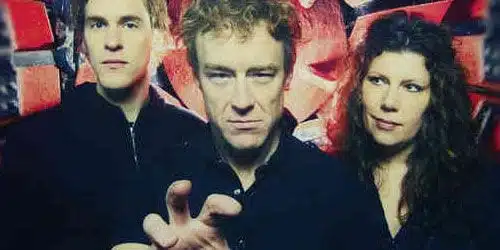
In preparing to see Low, I came upon a comment on The A.V. Club’s review of Low’s new album, The Invisible Way, by someone who saw Low live circa 1996 and felt “a strange sense of utter absorption and utter boredom, often at the same time.” This might be the common conception if you’re going to see a band whose music has been dubbed “slowcore”, but either Alan Sparhawk and Mimi Parker’s stage presence has improved considerably, or The Society for Ethical Culture’s Concert Hall was the perfect place for their somber songs to unfold, because the duo’s showing on the New York date of their current tour was unbelievably gripping.
The Concert Hall at the Society for Ethical Culture is a venue whose stage is not often frequented by indie rock acts. Peaches performed there in 2010, but mostly the venue attracts artists similar in style to the night’s openers, the ACME String Quartet. The quartet, who specializes in works by contemporary composers, may not have been the entire audience’s cup of tea, but the players did their best to uphold the goal on which the Wordless Music Series – which this very show was a part of – was founded: contemporary classical music and indie rock aren’t the strange bedfellows that one may initially suspect. At least a few audience members were there specifically for ACME; an elderly man sitting in front of me left while Low were still setting up.
When Low did enter, it was to respectable fanfare from the crowd and with little chatter from Sparhawk. When he later blurted out “One more song, then I’ll talk,” you almost wished he would never, for fear of disrupting the hypnotic flow of the music and visuals on stage (a film, featuring footage of everything from parasailers to orange groves, played behind Low throughout the set). It was fitting that Low performed The Invisible Way’s “Holy Ghost” early in the evening; songs both new and old were imbued with sanctity thanks to the Concert Hall’s pure acoustics (not to mention the pews acting as concert seats made you feel like you were drinking in church). The crispness of the soundsystem–and the general feel of Low’s music–somehow evoked an intimacy in spite of the aloofness of the artists on stage. The brightness of the venue’s lights were something to be reckoned with too, although they grew considerably darker as the night went on. It can’t necessarily be said that the lighting scheme tied in with Low’s songs, however; thematically, they are almost all dark.
Having ten releases under their belts, it was seemingly easy for Sparhawk and Parker to create a considerably varied setlist for the evening. Although Low’s breakthrough, 2001’s Things We Lost in the Fire, was only highlighted twice, the two songs selected from it – ”July” and “Dinosaur Act” – won the popularity contest for the evening thanks to some particularly enthusiastic cheering from the consistently reverent crowd.
Although it seems sacrilege to even attempt to fill out Low’s notoriously sparse sound, the ACME quartet joined Sparhawk, Parker, and multi-instrumentalist Steve Garrington for roughly a third of the set. This portion of the show brought surprises in both song selection (the quartet enabled Low to perform “I Hear…Goodnight” from their collaborative EP with The Dirty Three, In the Fishtank) and accordance; while spare, the added instrumentation proved that – rather than overpower the light arrangements – extra strings work well in amplifying the devastation. Low’s more revelatory moments, like the swells in “So Blue” and the guitar freak-out in “On My Own”, really compelled thanks to ACME. Garrington, who seemed so delighted to be performing that he could barely stay seated at his keyboard, also proved a nice and comparatively light-hearted addition.
In the end, simple beauty ultimately reigned supreme. Before playing the short and lovely “Last Snowstorm of the Year”, Sparhawk gave a shout-out to his fellow Minnesotans by prefacing it with, “this is for our cold friends back at home.” Although it wasn’t what one could call a remarkable bit of banter, it showed a thoughtfulness behind some of the remoteness presented on stage. Sometimes, a band not choosing to indulge in banter can contribute to something beyond entertainment. Regardless of whether it is Low’s main objective to entertain or not, as far as creating a lot of beauty from very little – particularly in a live setting – there is no competition.

